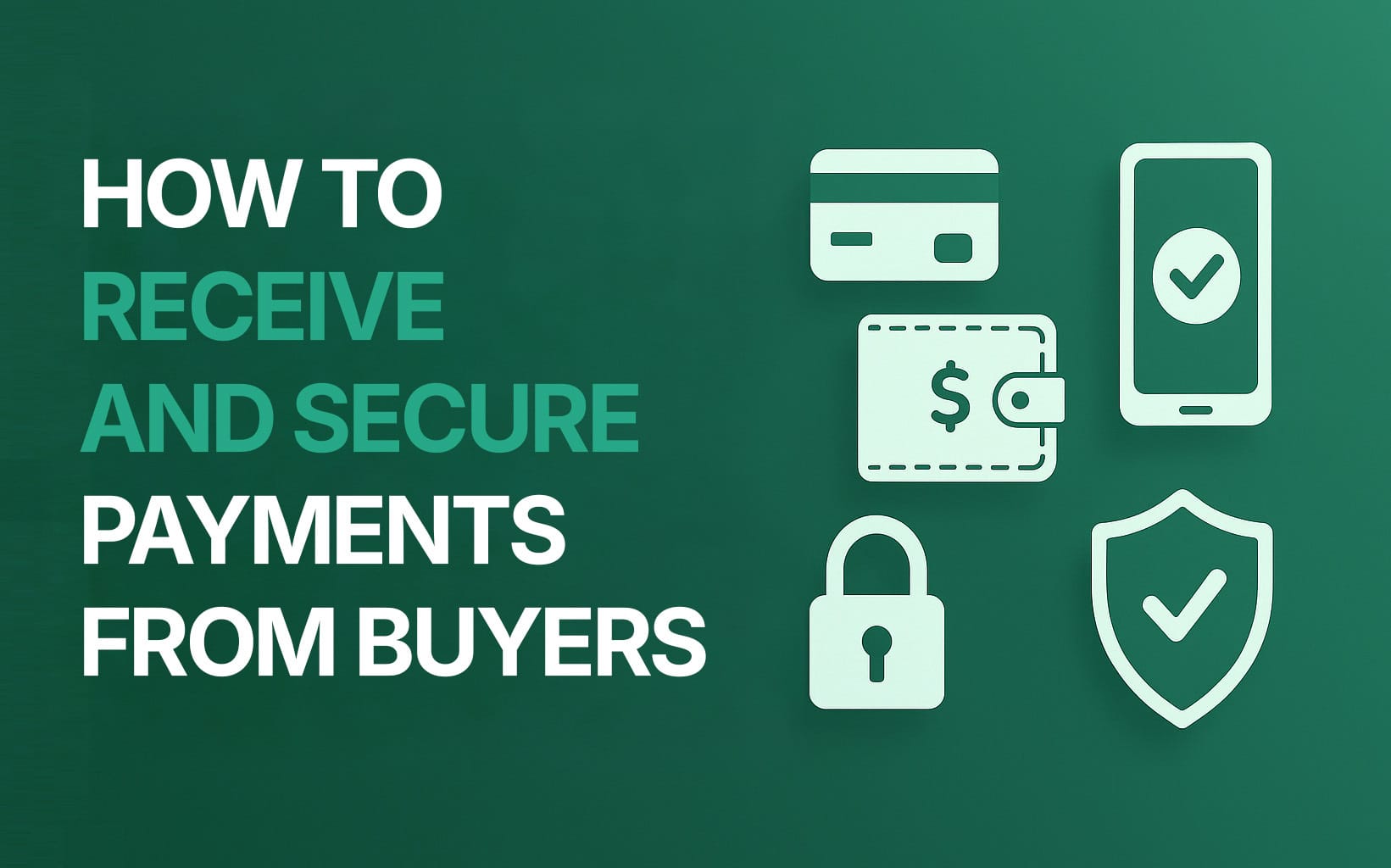How to Receive Payment from Buyers and Ways of Securing Them
Learn how to receive payments from buyers safely through bank transfers, cards, digital wallets, escrow, or crypto. Discover secure payment practices for exporters.

The proper reception of payment in international trade, which will determine if your business will be a success or failure in the fast-growing world of international trade, is a critical aspect. Secure payment processing not only guarantees the protection of your revenue but also injects trust in your customers. This article details various payment methods applied to businesses and effective strategies for securing such payments.
Understanding Payment Methods
The payment methods through which payments can be received from the buyer are diverse. Each method of payment has its merits and considerations, so the right choice relies on several factors, such as the magnitude of the transaction, the preference of the buyer, and even the nature of the business. Some of the most commonly used payment methods in international trade are given below:
Credit and Debit Cards
Credit and debit cards are now probably the most popular forms of payment globally. They ensure great convenience to buyers and sellers alike and let transactions be completed quickly without involving cash. The following security features are some of the measures that ought to be observed to ensure safe transaction processing in card-based payments:
- Encryption: Use of Secure Sockets Layer (SSL) or Transport Layer Security (TLS) protocols to encrypt sensitive card information during transmission.
- Tokenization: Tokenization is the replacement of sensitive card data with unique tokens that cannot be used if they are intercepted.
Bank Transfers
Another very popular means of acceptance is bank transfer, which comprises both wire and ACH or automated clearing house payments. They can be used for higher-value transactions, which is helpful because, as against card payments, they are very secure, reliable, and risk-free. However, bank transfers take more time to execute than card payments. To enhance security:
- Verify Sender Details: Before processing large money transfers, one should always verify the sender's bank details to avoid becoming a victim of fraud.
- Use Multi-Factor Authentication (MFA): The control will access the banking platform with the help of MFA and raise security by a notch.
Digital Wallets
Digital wallets like PayPal, Skrill, and Google Pay are very easy and convenient, and their ease of use has seen a rise in popularity. Besides this, they allow buyers to make fast payments and not type out card details each time. For transactions to be secure through a digital wallet:
- Regularly Update Security Features: Ensure that your digital wallet provider is using the most updated version of encryption and fraud detection methods.
- Educate Customers on Security Practices: Educate customers to adopt a minimum password strength and persuade them to activate two-factor authentication on their accounts.
Escrow Services
For more secure transactions, you may use an escrow service when dealing with high-value transactions or involving first-time buyers. An escrow service holds the payment of the buyer until both parties have complied with the terms of the agreed-upon contract. This will eliminate some of the risks involved in non-payment or delivery.
Cryptocurrency
In response to digital currencies, such as Bitcoin and Ethereum, some companies will accept cryptocurrency as a new mode of payment. Of course, this increases the fees in lesser transactions but expedites the processes. However, this comes with some volatility risks. To secure cryptocurrency transactions:
- Use Reputable Wallets: Invest in a security wallet that offers you encryption and multi-signature features.
- Stay Informed About Regulatory Changes: Cryptocurrency regulations exist in every country; update knowledge to meet the requirements.
Securing Payment Processing
Regardless of how a customer is going to make his payments, securing processing for today in this digital age is rather important. Here are a few effective strategies for improving payment security:
- Implement Strong Encryption Protocols: Strong encryption protocols are very important in protecting sensitive payment information during transactions. This involves employing SSL/TLS encryption in online payments to secure data from unauthorized access.
- Regularly Update Security Measures: Cyber threats evolve with time. That is, firms are to update their security measures regularly. This involves the most up-to-date software and the application of patches of security. Your payment systems should also be subject to regular audits.
- Utilize Fraud Detection Systems: Advanced systems for detecting fraud can identify suspicious activities in real-time. These typically analyze transaction patterns for anomalies that carry suspected fraudulent behaviour.
- Educate Your Team: You ought to educate your employees about good practices in the most secure payment processing. Teach how to recognize phishing attempts, make a secure payment customer data process, and adhere to a PCI DSS regulatory compliance rule.
- Provide Clear Security Information to Customers: Communicate your security measures to your customers in order to win confidence in your payment processes. Post security badges on your website and tell customers how you protect their data in a transaction.
Final Thoughts
Now that you know how to take payments from clients and how to secure them through different payment methods, you can begin applying those methods in your business operations. Assess which of those payment methods suits your needs while prioritizing the practices with secure payment processing. In order to keep your earnings safe and increase customer confidence, you can verify all information of every transaction and use strong security measures. Be constantly proactive in upgrading your payment systems and keeping abreast of what happens around you as part of industry trends, which will further help you in your journey of successful management of international transactions.